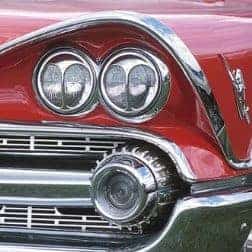
“I love my baby, but I’m crazy about my Chevrolet,” sang Grand Old Opry pioneer Sam McGee in 1928. Many share that sentiment today, nearly 90 years later. America’s love affair with the automobile has been deep and enduring.
But it may be running out of gas.
A 2013 University of Michigan study found that American motoring as measured by miles driven peaked in 2004 and has been declining since. Economics and demographics certain play a part, but perhaps technology does as well. As technology redefines the relationship between people and their machines, just maybe American culture is being transformed in the process.
Automobiles today are rolling information hubs. Advanced communication, entertainment and navigation systems are now available on most new cars. Some new cars permit drivers to send and receive text message using computerized voice technology. In Google’s vision of the automotive future, the car will become a “connected Android device.”
Many new cars also transmit maintenance and diagnostic information that can be read remotely by the owner or by the manufacturer. Electronic data recorders, widely known as “black boxes, compile critical information about a crash.
Very soon cars will be digitally integrated within the driving environment – interacting with other automobiles and even the transportation infrastructure. The goal, according to the U.S. Department of Transportation Research and Innovative Technology Administration, is to develop a “a fully connected transportation system that makes the most of multi-modal, transformational applications” to enhance safety, improve mobility and reduce the environmental impact.
Drivers undoubtedly will benefit from these innovations. Vehicles will be safer and more reliable, and the driving experience for some will be enhanced by sophisticated infotainment systems. But these benefits come with certain costs, including a loss of privacy and uncertainty as to how the enormous amount of information generated by connected cars will be used.
Law enforcement agencies already have expressed an interest in monitoring digital vehicle output for speed control, stolen vehicle recovery, and other purposes. It may be comforting that first responders can be immediately summoned to an accident or other emergency, or that a stolen car can be more easily located, but information broadcast by vehicles also may provide police or other government agencies with knowledge that most people consider private. In some cases constitutional issues may be raised. The line between respecting the privacy of drivers and identifying law breakers is not always clear.
The Vehicle Infrastructure Integration Coalition, a public/private cooperative effort to build a nationwide system of connected cars, claims that privacy concerns are a priority. They say that the system will be designed to assure driver anonymity. But history has shown that when valuable information is to be had, someone usually will find a way to get to it.
Which brings us back to the matter of American car culture.
The car has traditionally been a symbol of freedom and boundless possibility. “Well the night’s busting open/These two lanes will take us anywhere,” sang Bruce Springsteen in “Thunder Road.” Now it is more a cocoon and is just one more way that we are tethered to everything else in our daily digital lives. The technology already is there to verbally update our Facebook pages as we drive.
Perhaps more significantly, it is hard to think of a car as the great American freedom machine when you are concerned that it may be spying on you. Data generated by cars, for the most part, is not protected by privacy laws. Car owners have little control over who can see their data and how it can be used.
Of course, communicative cars are just one piece of the huge privacy conundrum we face in the age of Big Data. But it is one that cuts to the core of a rich piece of American cultural identity.